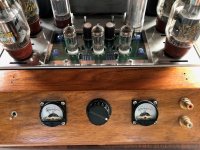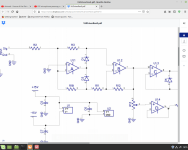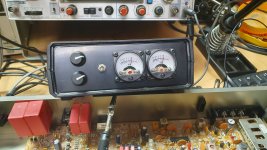Has anyone used one of the cheap Chinese "VU" meter boards + meters in any of their amp builds, if so did they work ok without modification? Also have such boards created problems with distortion? Lastly if meter driving circuits in general create unwanted THD & N can anything be done to alleviate it?
TFL, Andy.
TFL, Andy.
Can you be specific?
What chinese board you are talking about?
I used tube vu meter, needle arm vu meter, bar graph vu meter, all chinese.
What chinese board you are talking about?
I used tube vu meter, needle arm vu meter, bar graph vu meter, all chinese.
I have a set of those installed in my Tubelab SSE, powered by simple a wall wart tied to the AC input. Inputs on the meter controller tied to the RCA inputs. I made them switchable. The amp sounds identical whether the meters are on or off.
I used this in a stereo MPX encoder. Unfortunately the backlight is not installed in the meters, and retrofitting is difficult. As far as I remember, the input impedance of the amplifier is pretty low (10k or 22k, I can't remember).
Mine have backlights and they work as expected.Unfortunately the backlight is not installed in the meters
What makes you think this happens?Lastly if meter driving circuits in general create unwanted THD & N
The use of "if" in that sentence indicates uncertainty, not certainty.What makes you think this happens?
Hi Andy
With my ST-70, I used the meters but ditched the driver board. Instead, I use a very simple passive driver circuit described nicely, here: https://www.giangrandi.org/electronics/vu-meter/vu-meter.shtml. They are simply driven off the speaker posts.

Mine are switchable on or off (including backlight) and they seem to make no noticeable difference to sound - although I have not tried to measure any difference.
I guess that these are meters that dance nicely with the music rather than true VU meters, but they do look good and dance beautifully (possibly slightly underdamped).
Simon
With my ST-70, I used the meters but ditched the driver board. Instead, I use a very simple passive driver circuit described nicely, here: https://www.giangrandi.org/electronics/vu-meter/vu-meter.shtml. They are simply driven off the speaker posts.

Mine are switchable on or off (including backlight) and they seem to make no noticeable difference to sound - although I have not tried to measure any difference.
I guess that these are meters that dance nicely with the music rather than true VU meters, but they do look good and dance beautifully (possibly slightly underdamped).
Simon
Short answer, yes. Raed here for a much more detailed writeup: https://www.cascadetubes.com/the-purpleheart-signal-meters/Has anyone used one of the cheap Chinese "VU" meter boards + meters in any of their amp builds, if so did they work ok without modification?
I bought a pair of meters that came with passive driver boards. They did not scale correctly at all. Good for nothing but watching the needle bounce around. I purchased a proper driver board for them and they're extremely accurate now. I was really surprised how well they work.I guess that these are meters that dance nicely with the music rather than true VU meters, but they do look good and dance beautifully (possibly slightly underdamped).
Whilst browsing I stumbled on a thread posted on this forum where mention was made of N maybe THD induced in the first gain stages grid or signal ground. Unfortunately I can't find the thread to which I refer.What makes you think this happens?
Thanks Simon & SunC for those links. Proper VU meters or PPM meters have a specification & the meter itself is damped to have the correct ballistics. Most if not all advertised "VU" meters don't conform to this spec, essentially they are eye candy & a selling point for an amp, which isn't a bad thing necessarily. We all like big knobs, dials & glowing valves.
I've fitted meters to two amps up to now, but have had a few problems, which is probably down to what I used as the IP source. In both cases I used the attached circuit - essentially a hi IP Z buffer, precision rectifier, gain stage and OP buffer with vintage analogue meters. In the first amp I connected the meters to the anode of V1 or first gain stage, in the second I took the IP off the volume control pot. In both cases the meter could not display a low IP amplitude and the amp at full whack - the meter either didn't do much, or was pegged at FSD, too much dynamic range. this is easily solved by using the program source as the IP.
The other issue is ballistics, you don't want the needle flinging itself about as in a moshpit or doing not much but twitch occasionally like a inmate in a loony bin doped to the eyeballs.
Hence my question. I'm suspect about the quality of the actual meters, they look like cheap shite, you can't make a decent analogue meter for a few £'s or $'s. I was also suspicious of what looks like a very simple driver circuit to be able handle a possible large dynamic range and have decent ballistics. The issue reported in the thread I can't find made mention of possible distortion too.
Andy.
Attachments
Last edited:
That's exactly why I used them. Just for the looks, and adjusted to go into the red at the beginning of clipling. The dB values have nothing to do with reality, as expected.Most if not all advertised "VU" meters don't conform to this spec, essentially they are eye candy
@jcalvarez That's not entirely true; read my previous post. I used the meters on the input of an ADC that's 0dBFS @ 2Vrms. I calibrated the driver board at 0dBFS and used a signal generator to test every increment down to -20dB. The meters were dead accurate.
The ones I got have the driving circuit attached to the back of each unit, no active components, just resistors, diodes, capacitors and a pot. I connect them to the output transformers. I did some measurements and they surely did not show the right values.@jcalvarez That's not entirely true; read my previous post. I used the meters on the input of an ADC that's 0dBFS @ 2Vrms. I calibrated the driver board at 0dBFS and used a signal generator to test every increment down to -20dB. The meters were dead accurate.
There are other kits, with op amps etc, those are probably fine, but I describe tbe ones I got, which, to be honest, do what I wanted them for: retro looks.
- Home
- Amplifiers
- Tubes / Valves
- Cheap Chinese "VU" meters, meters on valve amps?

